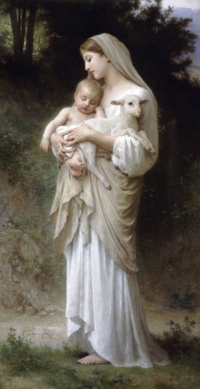Good
From The Art and Popular Culture Encyclopedia

|
Related e |
|
Featured: |
Good (see also "goods") may refer to:
- Good (religion)
- Good and evil - The distinction between positive and negative entities
- Good (economics) - Objects produced for market
- Form of the Good - Plato's macrocosmic view of goodness in living
- The good life - concept by Aristotle
Etymology
From Middle English good, from Old English gōd (“good, virtuous, desirable, favorable, salutary, pleasant, valid, efficient, suitable, considerable, sufficiently great”), from Proto-Germanic *gōdaz (“good”), from Proto-Indo-European *gʰedʰ- (“to unite, be associated, suit”). Cognate with Scots guid (“good”), West Frisian goed (“good”), Dutch goed (“good”), Low German god (“good”), German gut (“good”), Danish and Swedish god (“good”), Icelandic góður (“good”), Lithuanian guõdas (“honor”), Albanian dial. hut (“good, fit, appropriate”), Old Church Slavonic годъ (godŭ, “pleasing time”) and годенъ (godenŭ, “fitting, suitable”), Sanskrit गद्य (gádhya, “fitting, suitable”). Related to gather.
Contrast
See also

